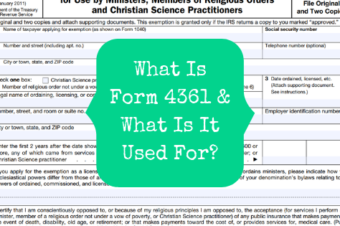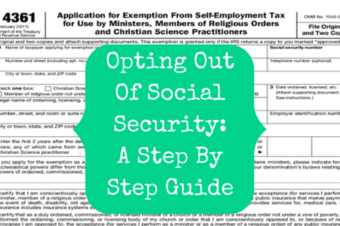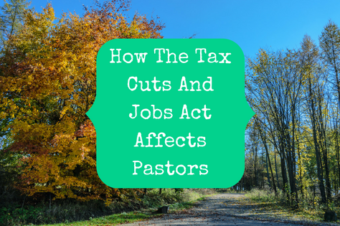
We recently went over Form 4361, the IRS document used by pastors to receive an exemption from self-employment taxes. If you’re not familiar with it, you should go back and read about it here.
One thing we didn’t discuss in that article, though, was the timing. That’s because I didn’t want to overwhelm you with too much information. So, today we are discussing the timing involved and I will give you multiple examples to make things as clear as possible. It is important that you understand when Form 4361 can be filed because once your window of opportunity is gone, it is gone forever.
Is There A Time Limit For Pastors To File Form 4361 To Opt Out Of Social Security?
Specific dates are requested on the form because you only have a small window of time in which you are allowed to opt out of Social Security. Form 4361 must be filed by the due date, including extensions, of the second tax year in which you have $400 or more of net earnings from self-employment, any of which came from ministerial services.
That’s kind of long, so let’s break it down in reverse:
Earnings From Ministerial Services
The clock starts ticking when you have earnings from ministerial services. The IRS defines ministerial services as the services you perform in the exercise of your ministry. Usually, that would be wages earned or offerings received as a pastor. However, if you perform a wedding and the father of the bride gives you a $50 bill, that also counts as earnings from ministerial services. Basically, any money given to you because of some pastoral thing you did counts.
$400 Of Net Earnings From Self-Employment
You need to have at least $400 of net earnings from self-employment for the tax year in question to count towards the time limit. It is important to note that you don’t have to have $400 of ministerial income. Other non-ministerial self-employment income counts towards the $400. Even if you only earn the $50 for performing the wedding, if you earned at least $350 in your secular side gig, it counts towards your two years.
Second Tax Year
The deadline to file Form 4361 is based on two tax years. Tax years are calendar years and for this situation, they do not have to be consecutive. So, if you earn at least $400 of pastoral income one year and none the next, the deadline to request an exemption will not be triggered until the next year that you have sufficient ministerial income.
Due Date, Including Extensions
Finally, the due date for your Form 4361 is the due date for your tax return, including extensions. Tax returns are usually due on April 15 of the following year. Sometimes the date gets pushed back a day or two if the 15th falls on a weekend or holiday. In addition, everyone is eligible to file for a 6-month extension to file their return, which pushes the date to October 15.
Let’s take a look at how this might look in real life.
Examples Of How It Applies In Different Situations
Let’s look at an example. You get licensed and start a regular pastoral job in 2021 which pays you $50,000 a year. That means that your first tax year is 2021 and your second tax year is 2022, so you have to file Form 4361 by the due date for your 2022 tax return. That was April 18, 2023, but you could file an extension until October 16, 2023. So, you need to submit your Form 4361 by October 16, 2023.
Here’s another example: You get ordained in 2020 and work part-time, earning $10,000. Then, you take two years off and earn no ministerial income. In 2023 you do a few weddings and earn $500. Your deadline for filing Form 4361 will be the due date for your 2023 return. Even though you were ordained in 2020, the following two years, 2021 and 2022, don’t count towards the time limit because you had no pastoral income during those two years.
One final example for the entrepreneurs out there: You have a small side business that generates $5,000 a year. You are ordained in December 2022 and earn $80 as a pastor that year. The next year, 2023, you work full-time as a pastor and earn $60,000. Your Form 4361 is due by the due date for your 2023 tax return. Even though your ministerial income was below $400 in 2022, your other self-employment exceeded the limit so that year counts.
It is vital that you understand the timing required for filing Form 4361. If you don’t file by the deadline, you forever lose the opportunity to opt out. There are no second chances here.




31 Responses
Randy Shull
June 7, 2020Thank you for your work! I had a couple of questions:
1. How long should it take to receive my approved Form 4361 from the IRS?
2.How do I file an extension for Form 4361?
Thanks in advance!
Amy
June 10, 2020Randy,
1. I’m not exactly sure how long it takes to get the Form 4361 approved. I would imagine in our current environment it will take awhile, though. Any other readers care to share how long theirs took?
2. This is the form to request an extension to file your tax return: https://www.irs.gov/pub/irs-pdf/f4868.pdf
Also, this year the tax filing deadline has been pushed from April 15 to July 15 due to the coronavirus.
Stacy Lemmon
September 16, 2020Thank you for this article! We just hired a new pastor in June. This is his first time working in ministry. He was wondering if he can file his Form 4361 this coming April 2021 or does he have to work in ministry for the 2 years to be able to opt out? Thank you in advance!
Amy
September 16, 2020Stacy, your pastor does not need to wait, he can file Form 4361 to opt out as soon as he starts working in ministry.
Ben A
January 12, 2021Hi Amy,
I’m really confused becaue it says on line 5:
Enter the first 2 years after the date shown on line 3 that you had net self-employment earnings of $400 or more, any of which came from services as a minister, priest, rabbi, etc.; member of a religious order; or Christian Science practitioner .
So surely in response to Stacy Lemon’s question you have to have completed two years of self employment earnings to apply?
I’m seriously confused!
Amy
January 13, 2021Ben, they ask you to enter the years in which you had those earnings in order to ensure that too much time hasn’t passed. In the instructions where it discusses When to File, it provides a due date but gives no indication that you have to wait any amount of time. The instructions only say that you cannot file the form BEFORE you are ordained, commissioned, or licensed. I know pastors who have filed the form as soon as becoming licensed and been approved without any problem
Titan Brave
January 26, 2021Thanks Amy,
Do you know if you need to do amended tax returns to exempt previous social security tax that we had to pay?
Amy
January 29, 2021Titan, you will need to file amended returns to get a refund of Social Security tax that you already paid in.
Jarred
January 26, 2021April 15th 2021 will be the “2 year deadline” for me to file so I will be sending mine in this month (Jan 2021). If it takes longer than 3 months to be approved should I file for a tax extension or file my taxes normally. The language says it has to be “filed” by that second year so I would assume if I send it by certified mail and have a receipt that shows I sent it this month then I’d be fine and I should pay my taxes to avoid penalties.
Titan Brave
January 26, 2021Bump – same question.
Amy
January 29, 2021Jarred & Titan,
You are correct, Jarred. Do not put off paying your taxes. Even if you have an approved filing extension, taxes are due by April 15 and you will start to accrue interest and penalties if you wait to pay them.
Heather
February 23, 2021My husband was ordained in October 2010. By some tragedy, we were not informed of the benefit of opting out of Social Security. In the past year, we found out that benefit was available to us. He has been earning full-time pay as a minister since 2010. I understand that he would have to have been being paid as an ordained minister for two years to take advantage of this benefit. And I understand that the deadline to take advantage of the benefit for the second year is available to him. What we need clarification on is if we file a request to opt out and it is dated this year, this is 11 years from ordination. Will they automatically deny it simply because it’s not within the first two years? Or will they approve it and we Just amend years 2012 through 2019?
Amy
February 25, 2021Heather, if your husband has been earning ministerial income since 2010, then he is far past the 2-year deadline to opt out of Social Security. The fact that it refers to “net earnings from self-employment” may be tripping you up. All ministerial income is considered earnings from self-employment, even if the pastor is regularly employed by a church. Social Security taxes for pastors are paid as if they were self-employed, on Schedule SE. If your husband has been being paid as a minister, then you won’t be able to amend anything to have the opportunity to opt out of Social Security.
Denice
May 31, 2022Hi Amy,
My dad is in a similar situation as Heather’s husband. He has been in ministry for many years but was unaware of this benefit. So, you are saying that because he did not file this form within those first two years, he can never file? Can’t he start from the last two years?
Thanks
Josh
November 16, 2021I have been working for an international missions organization since 2007. I wasn’t ordained until this year (2021). I have been filing my taxes every year as self employed and when they ask for type of work I have always stated “Missionary.” My questions is am I to late to file Form 4361? I have had over a decade worth of ministry work, but I was never officially ordained as a minister of the religious order. Any help on this would be wonderful! Thanks
Amy
November 18, 2021Josh, being “ordained, licensed, or commissioned” is a requirement for filing Form 4361, so based on that I would say that you are still able to opt out. The IRS does not want to get involved in church matters and how churches define different roles, so they will likely base their decision on the fact that you were not ordained until this year and consider that the beginning of your ministerial work.
Jim
February 28, 2022I was commissioned as a pastor in November, 2020. For 2020, I had no other self-employed income and only $100 ministerial income. For 2021 I worked part time as a pastor and earned about $11,000 in pastor salary and housing. I am bi-vocational and am an employee for other job which takes out social security and Medicare.
Am I correct in understanding the form 4361 would not be due until tax year 2022, and that exempting my ministerial income would not impact obtaining social security in the future and my other job would continue to earn me quarters toward SS/Medicare – I do have well over the necessary number of quarters from previous income.
Amy
March 1, 2022Jim, you are correct on all counts. If you didn’t have at least $400 of self-employment income in 2020, then your Form 4361 is due on the due date of your 2022 return. You will continue to pay into SS/Medicare through your secular employment and will still be able to receive benefits based on that employment.
Becky Wilson
October 20, 2022Hi! My husband was ordained in 1996, and pastored for a few years. Then in 2003 he became an Army Chaplain and has retired recently from the Army. He is now the pastor of a local church and just learned of this option to opt out of SS. Is he eligible to opt out since he is re-entering the pastorate? Or, did he miss his opportunity?
Thanks!
Becky
Janie
December 15, 2022My nephew filed this form himself and left out the 2 years required on line 5; he is still within the 2 year period but his form was denied for timeliness. He filed it in June of 2022 with an extension for personal taxes until Oct 15 2022. His ordained date was in 2016 however his first year receiving SE wages was 2021. Can he send a letter with the info that was missing and ask for forgiveness or is he just out of luck? Any assistance is greatly appreciated.
Amy
March 6, 2024My husband has been a pastor since 2007 but we did not know of the social security exemption option or we would have done it! My question is, can my husband get a secular job and preach for free for a couple of years, then go back into paid service and opt out of social security? Crazy question, but if it works, it would be worth it!
Romy
April 12, 2024So my husband was ordained in November 2022. Does that mean he would have to file the form by April 2023?
Amy
April 15, 2024If he had at least $400 of ministerial earnings in 2022 then the deadline to file Form 4361 would be the due date for the 2023 tax return, which is today. Extensions apply, so that would give you until October.
Sean
January 29, 2025Hi Amy,
I was ordained in 2009 and completed my Form 4361 in 2009 and was approved. I utilized the exemption in 2009, 2010, 2011, and 2012. I was out of ministerial work from 2013 – present. I am now back in ministerial work for Calendar Year 2024. Do I need to resubmit Form 4361 or will it still be on record with the IRS?
Amy
February 2, 2025Sean, Form 4361 is a lifetime exemption so you do not need to submit it again.
Wes
March 1, 2025I have been ordained and pastoring since 2012. I am bi-vocational. In 2024, my church switched to using a W2; before, what I received was considered self-employment. I do not and have not received “income”, the church considers it “housing allowance.” My question is, since the church has just switch to a W2, and no “income” has been reported, just housing allowance, can I complete form 4361 now?
Amy
April 13, 2025It is likely too late for you to file Form 4361. Housing allowance is considered ministerial compensation even though it is not subject to income taxes. If you have received any kind of income for your ministerial services, including a housing allowance or self-employment income, for more than two years since becoming ordained you have missed the deadline.
Shadow
March 6, 2025My dad was a retired minister/pastor in 2024. At the start of his ministry he opted out of Social Security. He passed away in November 2024. During the year he received disability pay from before his official retirement pay started. He also received retirement pay until his death. Does the opt mean that he does not need to pay social security/Medicare taxes on any of this income that he received? If he still needs to pay on it, would the parsonage/housing allowance be applied first, to reduce his taxable income?
Amy
April 13, 2025Opting out means you don’t have to pay Social Security and Medicare taxes on your ministerial income. Retirement benefits are usually also exempt from Social Security and Medicare taxes. If he hadn’t opted out, then he would still pay those taxes on his housing allowance.